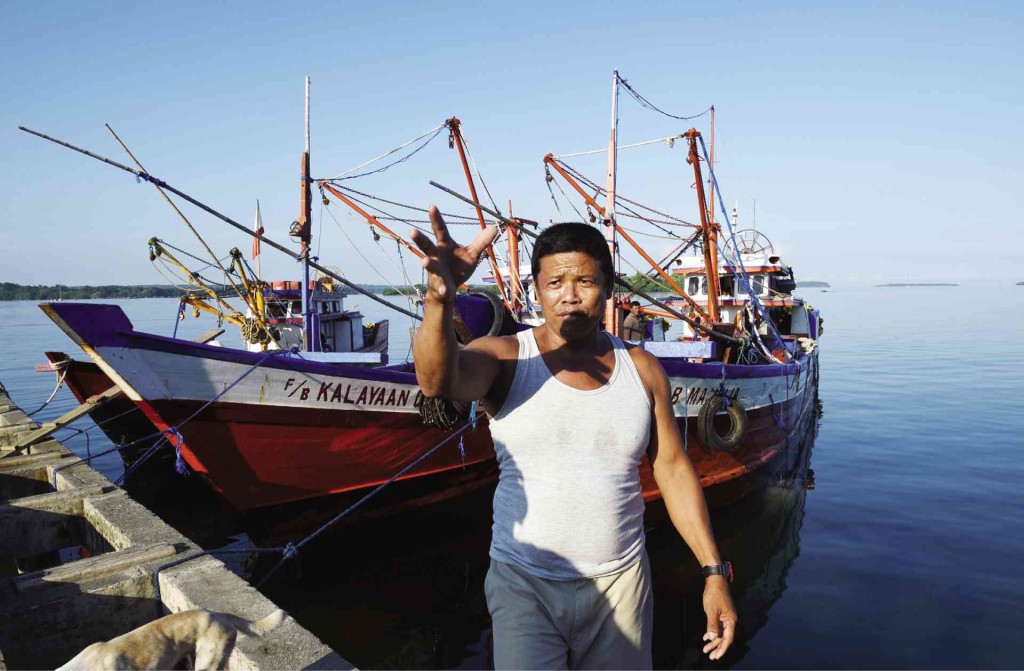
IDLED Epifanio Marqueza, one of the captains of a reef-fishing fleet, gestures next to his vessel idled in Masinloc, Zambales province, after an encounter with a Chinese Coast Guard ship at the nearby Panatag Shoal. AFP
The United States on Wednesday called on China and other rival claimants to exercise restraint when an international tribunal issues a landmark ruling on the South China Sea disputes that Beijing has chosen to ignore.
A senior US state department official, who spoke on condition of anonymity to Asian journalists through a teleconference, said the upcoming decision by the arbitration panel in The Hague may offer “a great deal of clarity” on the disputes and help the claimants forge an arrangement to avoid potential confrontations.
She said the decision, expected within weeks, could also serve as a jumping-off point to diplomatic talks.
“We would certainly call on all governments to exercise restraint and to use this post-arbitration period as an opportunity to restart those diplomatic discussions,” she said.
China has said it would not recognize any arbitration decision despite calls by several Asian and Western governments for it to respect international law.
Some fear Beijing may take a harder stance and take provocative actions if it comes under pressure from outside, including by the United States, to comply with an adversarial ruling.
In a harsh attack on US policies in Asia, the flagship newspaper of China’s ruling Communist Party on Wednesday accused Washington of seeking to turn the South China Sea “into a powder keg” and warned it not to underestimate China’s determination to defend its territorial claims.
The People’s Daily cited recent combined exercises by two US Navy aircraft carrier strike groups off the eastern coast of the Philippines as a sign of US hegemony and said Washington had made a mistake in seeking to intimidate China.
In making displays of military power aimed at China, the United States has “picked the wrong counterpart,” said the editorial, the contents of which are usually vetted by high ranking party officials.
Competing claims
US military activity, including freedom of navigation cruises near China’s man-made islands and exercises with allies, is contributing to the militarization of the region, the editorial said.
China claims almost all of the 3.5-million-square-kilometer South China Sea, including waters close to the shores of its smaller neighbors in the region.
The Philippines, Brunei, Malaysia and Taiwan have overlapping claims in the South China Sea, a crucial waterway where $5 trillion in global shipborne trade passes every year and where islets, reefs and atolls are believed to be sitting atop vast energy reserves.
Beijing prefers one-on-one negotiations with each of the rival claimants, an arrangement that gives it advantage because of its sheer size and clout and prevents Washington from playing any role to resolve the conflicts.
In the case filed in the United Nations Permanent Court of Arbitration, the Philippines challenged the validity of China’s “nine-dash line” claiming virtually the entire stretch of the South China Sea and demanded respect for its right to explore resources in waters within its 370-km exclusive economic zone (EEZ).
The Philippines also asked the tribunal to rule whether several disputed areas are outcrops, reefs or islands and how much stretch of territorial waters they project.
Natuna incidents
The US official also expressed concern over China’s Coast Guard ships escorting Chinese fishing vessels in areas including Indonesia’s Natuna Islands, where Indonesian vessels fired warning shots on Friday.
Indonesia has rejected China’s stance that the two nations have overlapping claims on “maritime rights and interests” in the South China Sea.
Indonesian Foreign Minister Retno Marsudi on Wednesday said his country had “no overlapping claims in any form in Indonesian waters with China.”
But Jakarta has objected to Beijing’s inclusion of waters around Natuna Islands within its “nine-dash line” claim to almost all of the South China Sea.
A Chinese fishing boat entered those waters on Friday, prompting an Indonesian naval vessel to fire a warning shot, injuring one person.
It was the third reported confrontation between Indonesian naval vessels and Chinese fishing boats near the Natuna Islands this year.
Confrontation at Ayungin
The Philippines also has stood up to China’s bullying in the South China Sea, with a small, rickety Bureau of Fisheries and Aquatic Resources vessel outsmarting a large Chinese Coast Guard ship to restock a small Marine garrison on the BRP Sierra Madre on Ayungin Shoal (Second Thomas Shoal) in the Spratly Islands on March 29, 2014.
The next day, the Philippines submitted evidence to the arbitration court in The Hague, which proceeded to hear the case despite China’s refusal to take part in the proceedings.
In his last week in office, President Aquino is waiting for the ruling, which he hopes will be in favor of the Philippines.
“We have done what we can [to obtain] a resolution that is fair to all parties concerned,” Mr. Aquino told reporters in a recent news conference.
Mr. Aquino steps down on June 30. Reports from the wires and Nikko Dizon